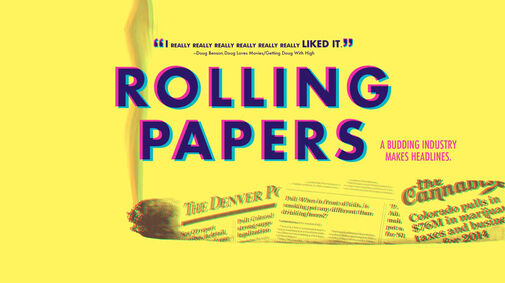Film ReviewsRolling Papers
Feb 18, 2016 Anchorage Press
|
|

The documentary, Rolling Papers, by Mitch Dickman and his team of nine other filmmakers and producers is about the first year of Colorado's legalized marijuana effort. Actually, no, it's about the media that covers the rise of the marijuana industry in Colorado and how that coverage saves the Denver Post. Wait, perhaps, Rolling Papers, is about the Colorado Cannabis Cup; or maybe it's about parenting and weed, and the fear that Child Protective Services may overreact at any moment. It could even be about the medicinal uses of cannabis and how it saves children. Perhaps, the documentary is about Ricardo Baca, the first marijuana editor, and his efforts to establish a team of journalists, as well as his travels to Uruguay to do a comparative piece on its legalized marijuana model. Maybe Rolling Papers is about the rise of the art of pot and the establishment of connoisseurs and commercial standards; it could even be about a photographer who makes his living in the industry.
Rolling Papers is loosely about all that, which one would think would give the film a brisk pace and structure, but instead, the miscellany of topics makes the film clunky and about 40 minutes in, viewers may wish they were high to tolerate the lulls and poor editing. However, the pace does pick up, and as the crew skims the loosely tied topics, they position these to pivot on Baca's professional persona, giving Rolling Papers some consistency.
Baca is a smart and dedicated journalist, and from a newspaper industry perspective, his risk-taking and follow-ups, missteps with Whoopi Goldberg, and ownership of mistakes, make him a compelling and integral part of the story. Rolling Papers as a piece of journalism however, misses the mark because it is in love with its subject, making it biased and unbalanced. It's the kind of film that appeals to folks who already agree with it, thus losing out on an opportunity to engage in real conversation about social, political, and economic aspects of the cannabis industry. When criticisms of the legalization of marijuana are touched upon, they are done so either in ways that polarize the issue, or they are addressed in a foreign (Uruguay) context and bear very little relation to the US dynamics.
The definition of documentary film as a non-fictional representation of the world changes constantly, its edges become blurred, going from genres like fact-based news reports to scandalous exposes, from historical reenactments to infomercials-it seems that anything that isn't deliberately fiction could be considered documentary, thus potentially, giving disproportionate weight and credibility to works even if they are unbalanced. Rolling Papers tries to cover too much ground, and in one particular direction; so while the film does fall under the documentary genre, it's unclear where it intends to go, other than the obvious: Marijuana legalization is complicated. As Rolling Papers jumps from topic to topic, returning to familiar faces here and there, the filmmakers intrude by asking the subjects, "Are you high now?" This leitmotif is cute at first but gets old quickly, as it undermines the subject's contribution regardless of what the answer may be.
Rolling Papers shows at Bear Tooth on Friday, February 19 at 10:15 p.m. and Monday, February 29 at 8 p.m.
Rolling Papers is loosely about all that, which one would think would give the film a brisk pace and structure, but instead, the miscellany of topics makes the film clunky and about 40 minutes in, viewers may wish they were high to tolerate the lulls and poor editing. However, the pace does pick up, and as the crew skims the loosely tied topics, they position these to pivot on Baca's professional persona, giving Rolling Papers some consistency.
Baca is a smart and dedicated journalist, and from a newspaper industry perspective, his risk-taking and follow-ups, missteps with Whoopi Goldberg, and ownership of mistakes, make him a compelling and integral part of the story. Rolling Papers as a piece of journalism however, misses the mark because it is in love with its subject, making it biased and unbalanced. It's the kind of film that appeals to folks who already agree with it, thus losing out on an opportunity to engage in real conversation about social, political, and economic aspects of the cannabis industry. When criticisms of the legalization of marijuana are touched upon, they are done so either in ways that polarize the issue, or they are addressed in a foreign (Uruguay) context and bear very little relation to the US dynamics.
The definition of documentary film as a non-fictional representation of the world changes constantly, its edges become blurred, going from genres like fact-based news reports to scandalous exposes, from historical reenactments to infomercials-it seems that anything that isn't deliberately fiction could be considered documentary, thus potentially, giving disproportionate weight and credibility to works even if they are unbalanced. Rolling Papers tries to cover too much ground, and in one particular direction; so while the film does fall under the documentary genre, it's unclear where it intends to go, other than the obvious: Marijuana legalization is complicated. As Rolling Papers jumps from topic to topic, returning to familiar faces here and there, the filmmakers intrude by asking the subjects, "Are you high now?" This leitmotif is cute at first but gets old quickly, as it undermines the subject's contribution regardless of what the answer may be.
Rolling Papers shows at Bear Tooth on Friday, February 19 at 10:15 p.m. and Monday, February 29 at 8 p.m.